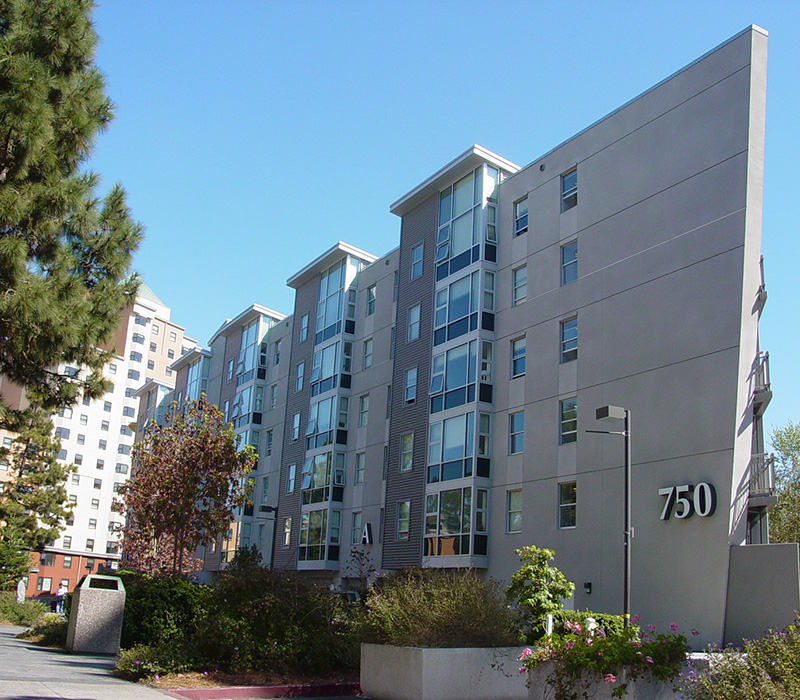Apply for SF State on-campus housing beginning March 4
New residence hall, reduced-rate housing program available to first-time freshmen
With a new residence hall scheduled to open in August, San Francisco State University will have an all-time high of 5,200 beds on campus this fall. The applications for on-campus housing for 2024 – 2025 opens on Monday, March 4.
The value of living on the San Francisco State campus goes beyond the five-minute walk from bed to class, providing furnished rooms and shorter leases than the standard 12 month off-campus housing choices.
A new reduced-rate student housing program for first-time freshmen also launches this fall. The first program of its kind in the California State University system, it will provide reduced rates for 725 students in any of the four residential communities available to first-time freshmen who meet the qualifications to receive a Cal Grant A or B financial aid award.
“Living on campus is the best deal for SF State students without a doubt,” said Jeny V. Patiño, associate vice president for Housing, Dining and Conference Services. “It is a one-of-a-kind social experience for each student, helping them to foster personal growth, academic success and ultimately a faster path to graduation.”
Based on SF State institutional research, students who live on campus are more likely to take additional units each semester and have a four-year graduation rate that is 58% higher than students who live off campus. Additionally, first-year students who live on campus achieve a grade-point average 10% higher than those who live off campus.
“Folks are motivated with school. Everybody’s main goal is to get through school,” said Josue Mendez, a Kinesiology major who has lived in two of the residential communities at SF State. “We give each other lots of help to succeed. I’ve never gotten an unwelcome feeling here.”
Mendez, from Sacramento, says he met most of his friends through living on campus. When he isn’t playing basketball at the Mashouf Wellness Center (a free fitness club for students), he and his friends enjoy sharing music, food and trips on public transit to the Haight-Ashbury, downtown and other parts of San Francisco.
“You get a lot of community,” Mendez said. “Just roam the halls and people have their doors open playing music. I’ve been introduced to music I never thought I’d like. It’s just magical.”
New housing and more
The New Housing Community at West Campus Green is a 751-bed building rising six stories high and covering 120,000 square feet. Each floor averages 12 “pod-style” rooms, each housing three students. The pods also include a shared all-gender bathroom and study and lounge spaces.
The new community is accompanied by another new building that will house the Gator Health Center and a residential dining commons opening in early 2025. The project is supported by $116 million from California’s Affordable Student Housing Grant Program.
SF State’s residential communities
Altogether, SF State offers nine residential communities in three neighborhoods on campus.
-
Mary Ward Hall and Mary Park Hall, which both opened in 1960, are traditional residence halls for freshmen. Rooms are double occupancy with common bathrooms, a community kitchen and lounge spaces.
-
The Towers at Centennial Square is a 16-story high-rise with one- and two-bedroom suites for freshmen and sophomores. Rooms are double or triple occupancy with a private bathroom, kitchenette and a living and dining area.
-
Towers Junior Suites is a five-story building with partial suites. Rooms are double occupancy and include a private bathroom.
-
The Village at Centennial Square, which opened in 2001, features two- and three-bedroom apartments for transfer and international students. Rooms are single or double occupancy with a private bathroom, full kitchen and a living and dining area.
-
Manzanita Square, built in 2020, is a mixed community for sophomores, juniors, seniors, graduate and transfer students interested in living year-round. This community offers apartment-style living: private bathrooms, full kitchen, and a living and dining area, with single and double occupancy available. The eight-story building also features lounge and study spaces, a gym and a community courtyard.
-
University Park North was built in the 1950s as the Stonestown Apartments before being purchased by SF State in 2005. It is a mixed community for sophomores, juniors, seniors and graduate students. It has apartments of one, two and three bedrooms. Rooms are single or double occupancy with private bathroom(s), a full kitchen and a living and dining area.
-
University Park South, enmeshed with the Parkmerced apartment community next door to campus, is for sophomores, juniors and seniors. It has apartments of one, two and three bedrooms. Rooms are single or double occupancy with private bathroom, a full kitchen and a living and dining area.

The Village at Centennial Square (foreground) and the Towers at Centennial Square
Students will move into their new campus residences at SF State in mid-August. Apply early for on-campus housing, as spaces are filled on a first-come, first-serve basis.
Learn about on-campus housing and apply online.